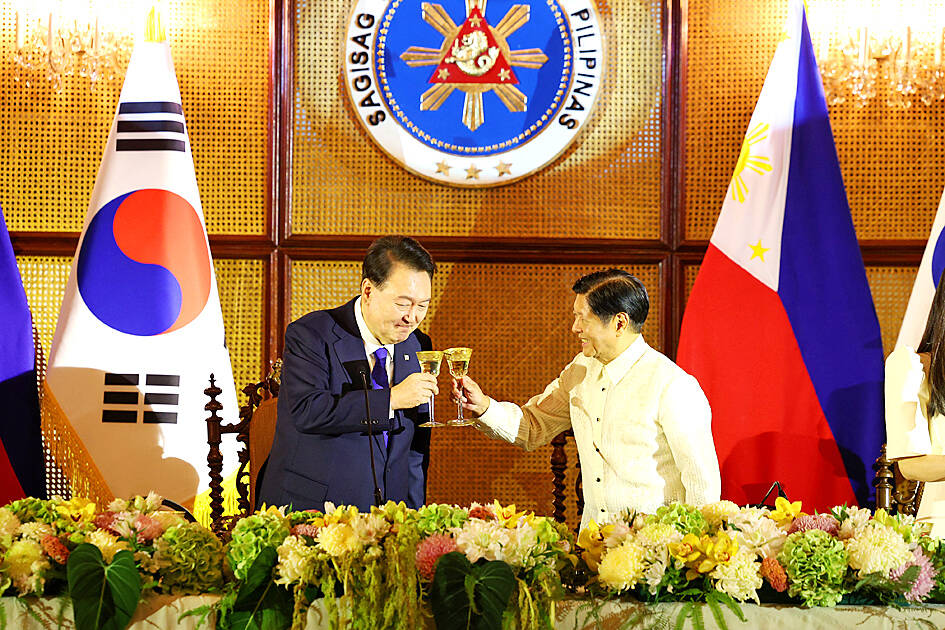South Korean President Yoon Suk-yeol and Philippine President Ferdinand Marcos Jr yesterday agreed to boost defense cooperation as their nations elevated ties to a strategic partnership amid growing security challenges in the region.
The two leaders discussed a range of issues including tensions in the South China Sea and on the Korean Peninsula during talks at the Philippine presidential palace where they also signed agreements on coast guard cooperation and nuclear energy.
“President Marcos and I opened a new chapter of our partnership by elevating our relationship to a strategic partnership,” said Yoon, who was on a state visit to Manila, the first by a South Korean leader in more than a decade.

Photo: EPA-EFE
Yoon said his nation would take part in the latest phase of the Philippines multibillion-dollar effort to modernize its military security at a time of rising tensions with China in the South China Sea.
South Korea has been trying to ramp up global defense exports, as Russia’s invasion of Ukraine opened the door to sign contracts from Europe, the Middle East and Asia.
The nation, which has sold FA-50 jets, corvettes and frigates to the Philippines, aims to become the world’s fourth-largest arms exporter by 2027.
In the third phase of its modernization plan, the Philippine military is looking to buy advanced assets such as fighter jets, submarines and missile systems, to beef up territorial defense and maritime security.
The two leaders agreed to uphold an international rules-based order, including on safety of navigation in the South China Sea, Yoon said, adding that they agreed the international community would never condone North Korea’s nuclear program or what he called “reckless provocations.”
Yoon, who was elected in 2022 on a pledge to boost South Korea’s nuclear power industry by targeting the export of 10 more nuclear power plants by 2030, announced the signing of a memorandum of agreement for a feasibility study on the long-dormant Philippine Bataan Nuclear Power Plant.
The plant has not produced any electricity since it was finished in 1984, despite its US$2.3 billion price tag and its promise of energy security during the 1970s oil crisis.

SECURITY: As China is ‘reshaping’ Hong Kong’s population, Taiwan must raise the eligibility threshold for applications from Hong Kongers, Chiu Chui-cheng said When Hong Kong and Macau citizens apply for residency in Taiwan, it would be under a new category that includes a “national security observation period,” Mainland Affairs Council (MAC) Minister Chiu Chui-cheng (邱垂正) said yesterday. President William Lai (賴清德) on March 13 announced 17 strategies to counter China’s aggression toward Taiwan, including incorporating national security considerations into the review process for residency applications from Hong Kong and Macau citizens. The situation in Hong Kong is constantly changing, Chiu said to media yesterday on the sidelines of the Taipei Technology Run hosted by the Taipei Neihu Technology Park Development Association. With

A US Marine Corps regiment equipped with Naval Strike Missiles (NSM) is set to participate in the upcoming Balikatan 25 exercise in the Luzon Strait, marking the system’s first-ever deployment in the Philippines. US and Philippine officials have separately confirmed that the Navy Marine Expeditionary Ship Interdiction System (NMESIS) — the mobile launch platform for the Naval Strike Missile — would take part in the joint exercise. The missiles are being deployed to “a strategic first island chain chokepoint” in the waters between Taiwan proper and the Philippines, US-based Naval News reported. “The Luzon Strait and Bashi Channel represent a critical access

CARROT AND STICK: While unrelenting in its military threats, China attracted nearly 40,000 Taiwanese to over 400 business events last year Nearly 40,000 Taiwanese last year joined industry events in China, such as conferences and trade fairs, supported by the Chinese government, a study showed yesterday, as Beijing ramps up a charm offensive toward Taipei alongside military pressure. China has long taken a carrot-and-stick approach to Taiwan, threatening it with the prospect of military action while reaching out to those it believes are amenable to Beijing’s point of view. Taiwanese security officials are wary of what they see as Beijing’s influence campaigns to sway public opinion after Taipei and Beijing gradually resumed travel links halted by the COVID-19 pandemic, but the scale of

Pope Francis is be laid to rest on Saturday after lying in state for three days in St Peter’s Basilica, where the faithful are expected to flock to pay their respects to history’s first Latin American pontiff. The cardinals met yesterday in the Vatican’s synod hall to chart the next steps before a conclave begins to choose Francis’ successor, as condolences poured in from around the world. According to current norms, the conclave must begin between May 5 and 10. The cardinals set the funeral for Saturday at 10am in St Peter’s Square, to be celebrated by the dean of the College